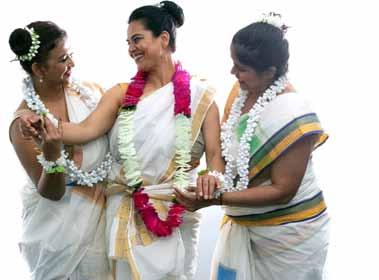
3 minute read
The purdah that st never e drawn
from 2019-12 Sydney
by Indian Link
Adakar Theatre s latest rod t on rev s ts the a ter ath o the Part t on o Ind a
BY RAJNI ANAND LUTHRA
Perhaps the Indian subcontinent ill ne er come to terms ith the incidents of . i en the fre uency ith hich stories from the Partition of India keep popping up in o ular culture it is clear that it is a ound that is not yet healed or one that ill not e allo ed to e forgotten.
Adakar Theatre picks up on this recurring theme in its latest production Where Did I Leave My Purdah? Prominent Mumbai lay right ahesh attani s scri t it has been claimed, is inspired by the real life story of ohra ehgal a theatre actor ho mo ed to India after Partition and became a leading figure in the erforming arts.


t tells the story of a ia egum an octogenarian ho after years in cinema ants to re i e the theatre com any of her youth ell no n for its roduction of the legendary Abhigyan Shakuntalam.
It is a script that lends itself easily to the lay ithin a lay format and in its ydney ersion the metatheatre of it all as e ecuted not unsuccessfully.
Stage right told the contemporary story; stage left, in dreamy blue lighting, took us ac years.
Directed by Saba Abdi, herself a contemporary of Dattani, the undoubtable star here is the story itself, a very personal tale of the human collateral of this heavily olitical act and its grossly iolent aftermath.
Bobby Mallick as lead actor comes a very close second though. he layed the aging di a effecti ely ith e ery dee throated laugh, every over-confident phone call, every rushing aside of those lo er do n the food chain.
ually she as more than con incing as the tormented old oman ho hides a shameful secret ith e ery tremor of her fingers e ery istful loo into the distance e ery his ered ord.
At the very end, she grabbed the limelight ith a successful amalgam of oth ersonas - a picture of smiling maternal love, but still very much the prima donna: I want to dance, spin me around.
Second leads Aparna Vats and Aparna Ti ori ala oth shone in the first half. Aparna Vats impressed as the feisty young a ia ho ould go to any lengths to e ith her lo e including gi ing u her family and country e en illing someone. nd yet rea ing u ith the lo e of her life not long after, she did not exactly resonate, even though there as lenty of loud histrionics. imilarly arna Ti ori ala as rilliant in the first half as a ia egum s niece u y ho shares a tur ulent relationshi ith her illustrious aunt. s the t o ic ered a ay the o ortunities for laughs came y thic and fast.
Ti ori ala da led in her disdain the light catching the glint in her eye as she plotted to reinstate her mother as the purer, inder more talented sister. ( ore a out the lighting later). nd yet in the second half she came undone fairly uic ly hen it ecame o ious that history had re eated itself in her o n life story. or oth ats and Ti ori ala sadly it s as if their characters ere rushed through to their conclusions after eing allo ed to de elo strongly early on.
The same could be said of the play itself: background being established in an intriguing and elaborate fashion in the first half the second half sa the emotional intensity go u a fe notches and the resolution reached far too s iftly.
leary the lot as s e ed strongly to ards the lead character to the detriment of others. uc ily o y allic as the aging thes ian rose to the challenge onderfully. ets ere fairly sim le and static ut ser ed the ur ose ell of con uring u a feel of theatre of an older era - trunks of costumes and ro s that a ia egum anted to get rid of almost as if anting to o literate certain as ects of her o n history. othing articularly note orthy in the costumes either, except that some of the cast a eared some hat stiff in their gear ha untala and her girlfriends articularly. ighting for some ine lica le reason dre attention to the feet e ce t on the odd occasion it caught the glint in arna T s eye.
The Shakuntala story meandered through the narrative, not just in the actual staging of bits of the original play, but also in the forgetting of the past, in the moving on ithout the significant elements of one s o n history, and in the ultimate jogging of the memory y a tiny to en.
The ta ea ays from Purdah ere many. e learnt that the effects of ar are felt for generations.
That men can e sa ages.
That e must tal more ith our grand arents.
That e must ma e amends no efore it is too late ith significant others ho are no longer in our li es.
That forgiveness and acceptance have the o er to free us internally.
That as long as stories of Partition continue to e told the in ustice of it all ill ne er e forgotten. nd that is the ery reason they must be retold, painful as they might be at e ery telling.









